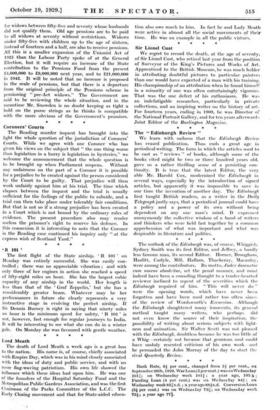Coroners' Courts The Reading murder inquest has brought into the
light the whole question of the jurisdiction of Coroners' Courts. While we agree with one Coroner who has given his views on the subject that " the one thing worse than legislation in a hurry is legislation in hysterics," we welcome the announcement that the whole question is to be brought up when Parliament reopens. Without any unfairness on the part of a Coroner it is possible for a prejudice to be created against the person considered by the Court to be guilty. That prejudice will then work unfairly against him at his trial. The time which elapses between the inquest and the trial is usually sufficient for the feelings of the public to subside, and a trial can then take place under tolerably fair conditions. But that is not so if a strong prejudice has been created in a Court which is not bound by the ordinary rules of evidence. The present procedure also may render useless the prisoner's right to reserve his defence. In this connexion it is interesting to note that the Coroner in the Reading case continued his inquiry only " at the express wish of Scotland Yard."






















































 Previous page
Previous page